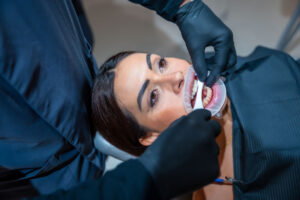Dental crowns are essential restorative solutions that protect and strengthen teeth compromised by decay, fractures, or extensive restorations. Crafted from durable materials such as porcelain, ceramic, metal, or zirconia, crowns provide long-lasting function and aesthetics. While these restorations are designed to endure daily wear, crown damage can occur, leading to potential discomfort and oral health risks if left untreated. Recognizing early signs of damage allows for prompt intervention, preserving the integrity of the tooth and avoiding further complications.
Crown damage encompasses a range of issues, including chipping, cracking, loosening, or complete detachment. While some damage may appear minor, even small cracks can expose the underlying tooth structure, making it susceptible to decay, infection, or sensitivity. Additionally, a loose or ill-fitting crown can cause pain when biting, gum irritation, or shifting of adjacent teeth. Addressing crown damage quickly restores function, protects oral health, and prevents the need for more extensive treatments.
Common Causes of Crown Damage and Warning Signs
Dental crowns are durable, but various factors can contribute to their deterioration over time. One of the most common causes is biting down on hard objects such as ice, hard candies, or non-food items, which can create microfractures in the crown material. Additionally, grinding or clenching teeth (bruxism) places excessive pressure on crowns, increasing the risk of cracking or loosening. Poor oral hygiene habits can also lead to gum recession or decay around the crown, affecting its stability.
Recognizing the warning signs of crown damage can prevent further dental complications. Patients should be aware of increased tooth sensitivity, visible cracks or chips, discomfort while chewing, gum inflammation, or a crown that feels loose. If left unaddressed, these issues can lead to bacterial infiltration, decay of the underlying tooth, or complete crown failure. Seeking prompt dental care when these symptoms arise ensures timely restoration and prevents unnecessary pain or additional damage.
Preventative Measures to Protect Your Dental Crowns
Prevention plays a crucial role in extending the lifespan of dental crowns and avoiding unnecessary replacements. Maintaining excellent oral hygiene is the first line of defense—brushing twice daily with fluoride toothpaste, flossing around the crown margins, and using an antibacterial mouth rinse can prevent plaque buildup and gum recession. Avoiding chewing on hard foods and non-food items also minimizes stress on the crown, reducing the risk of fractures and chipping.
For patients who grind or clench their teeth, a custom-fitted nightguard is an effective preventive solution. These oral appliances protect crowns from excessive force, prolonging their durability and preventing premature wear. Additionally, regular dental check-ups every six months allow dentists to monitor the integrity of crowns, ensuring that any minor issues are addressed before they escalate into significant damage. Taking these preventative steps helps maintain the functionality and aesthetics of dental crowns for years to come.
Restoration Options for Damaged Crowns
When crown damage occurs, various restoration options are available depending on the severity of the issue. Minor chips or surface damage may be polished or reshaped to restore smoothness and functionality. In cases where a crown becomes loose but remains intact, re-cementation can securely reposition it, ensuring a firm and stable fit. However, if a crown has sustained significant fractures, deep cracks, or internal deterioration, a full crown replacement may be necessary to preserve oral health.
Selecting the right crown material for restoration impacts durability, comfort, and aesthetics. Porcelain and zirconia crowns offer high strength with natural translucency, making them ideal for front teeth restorations. Metal-based crowns, though less common for visible areas, provide exceptional durability for molars that endure heavy chewing forces. A skilled dental professional will evaluate the extent of damage, consider functional and cosmetic requirements, and recommend the most effective restoration approach for long-term success.
Are you ready to restore your smile with dental implants at our skilled and trusted dental practice? Don’t wait to get the smile of your dreams with us. Get in contact with our doctor, Dr. Dave Dodrill and our exceptional team at our practice to schedule an appointment today!




